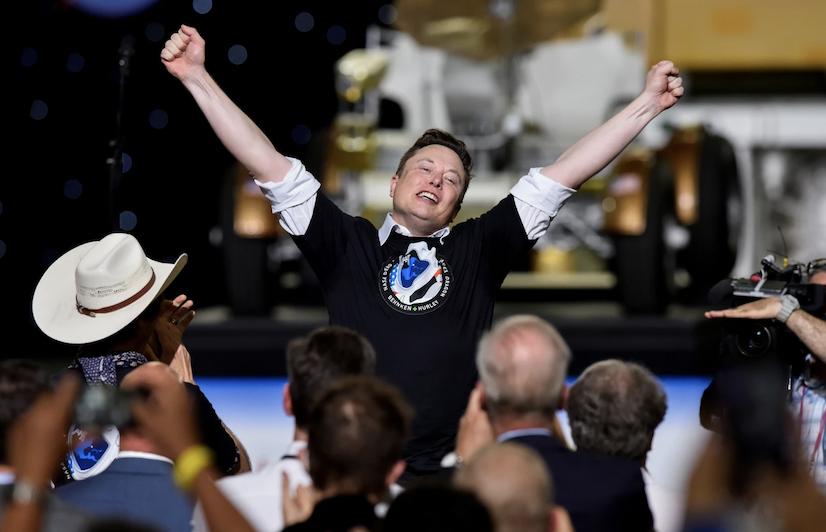Believe me; Elon Musk should not want to own Twitter. But then hubris can be blinding. I write as a former censor.
While Chairman of the Federal Communications Commission (FCC) complaints were filed against the broadcast company that syndicated Howard Stern’s morning radio show. I found two of the complaint transcripts actionable under a law to protect children from obscene content. Suddenly I became one of Stern’s morning show targets including his wishing me dead when I went into the hospital for cancer surgery. While there my wife answered hostile calls from some in his fan base.
Since I wasn’t selling anything, there was no reason to worry about spillover. Maybe I should have been, because I received more notoriety from those complaints than anything else the Commission did. If software to help parents screen out Stern’s vulgar shtick had existed, I would have eagerly sold it. A large part of his audience was pre-pubescent males—now in their 30s and earlier 40s.
At the time new communications technologies were coming out of the laboratories and re-shaping the FCC’s role. Liberation from the world of channel scarcity was soon to emerge and Twitter is one of the offspring. Twitter allows most everybody to post on a public network what they want to say.
Predictably, but unfortunately, some people have rabid typing disease. At times it is impulsive and hyper-emotional. At times the posts are drawn from a vocabulary that seems to start and stop with the F word. And of course, there are the predators: pornographers, criminal fraudsters, raw racists and the like—the clutter of bent minds.
Now, I can’t go further without introducing you to the Communications Decency Act and the pivotal Section 230 which goes to the nub of censorship. Drawing from Wikipedia:
“No provider or user of an interactive computer service shall be treated as the publisher or speaker of any information provided by another information content provider.”
Section 230(c)(2) further provides “Good Samaritan” protection from civil liability for operators of interactive computer services in the good faith removal or moderation of third-party material they deem “obscene, lewd, lascivious, filthy, excessively violent, harassing, or otherwise objectionable, whether or not such material is constitutionally protected.”
And that is why Musk doesn’t want to own Twitter. The so-called Good Samaritan provision means that the burden is on the provider (Twitter) and not the government to be the censor. Musk, of course, would be too busy to decide when words, phrases, visual images are “obscene, lewd, lascivious, filthy, excessively violent”. And, maybe he wouldn’t care.
Musk, and he would be the name on the marquee, could decide not to worry about virulently anti-social speech. Either way he would have a minute-by-minute problem because a large majority of Americans care about what is published. I learned that and to the extent it was necessary to remind me the Congress held hearings with me in the hot seat.
Elon Musk, of course, sells things on most continents. As CNBC reports, under recently passed laws: “Tech companies will be required to implement new procedures designed to take down illegal material such as hate speech, incitement to terrorism and child sexual abuse.” Welcome Mr. Musk to global restrictions.
So, as the various scenarios play out along financial lines and stockholder maneuvering, the real cost to Elon Musk who sells Tesla’s, solar panels, internet connections and much else has nothing to do with Board of Director shaped poison pills. If he owns Twitter he will become, by law, one of the world’s foremost censors.
Al Sikes is the former Chair of the Federal Communications Commission under George H.W. Bush. Al writes on themes from his book, Culture Leads Leaders Follow published by Koehler Books.



Matt LaMotte says
The thought of the likes of Elon Musk being an internet broadcasting gate-keeper is horrific!
Forster says
As Always … exceptional insights !!
Hugh (Jock) Beebe says
Mr. Sikes,
I appreciate your view of Musk’s pursuit of Twitter ownership, and certainly you have a uniquely qualified perspective. However, it strikes me that Musk’s recent public comments on his motive for that ownership may represent an alternative to the long standing conflict between content producer and authoritative censor such as you describe between the FCC and a radio broadcasting company, and which generally seems to fail for Twitter.
The advent of ubiquitous, rapid social communication shows the problem of managing content to be qualitatively different from 40 years ago. It could be that the circumstances of today make single source censoring impossibly complex and ineffective. Perhaps Musk has understood that making a huge social media company evolve toward being self correcting, and deliberately avoiding classical censorship, would require truly innovative change. Musk is surely no stranger to that way of proceeding to move a business forward successfully.
Since it’s surely irrelevant that he has profit motivation, and some of his available, in depth, general interviews in the recent past have revealed a thoroughly considered concern for the public good. It would seem that it might be worthwhile to see what he could do with Twitter.